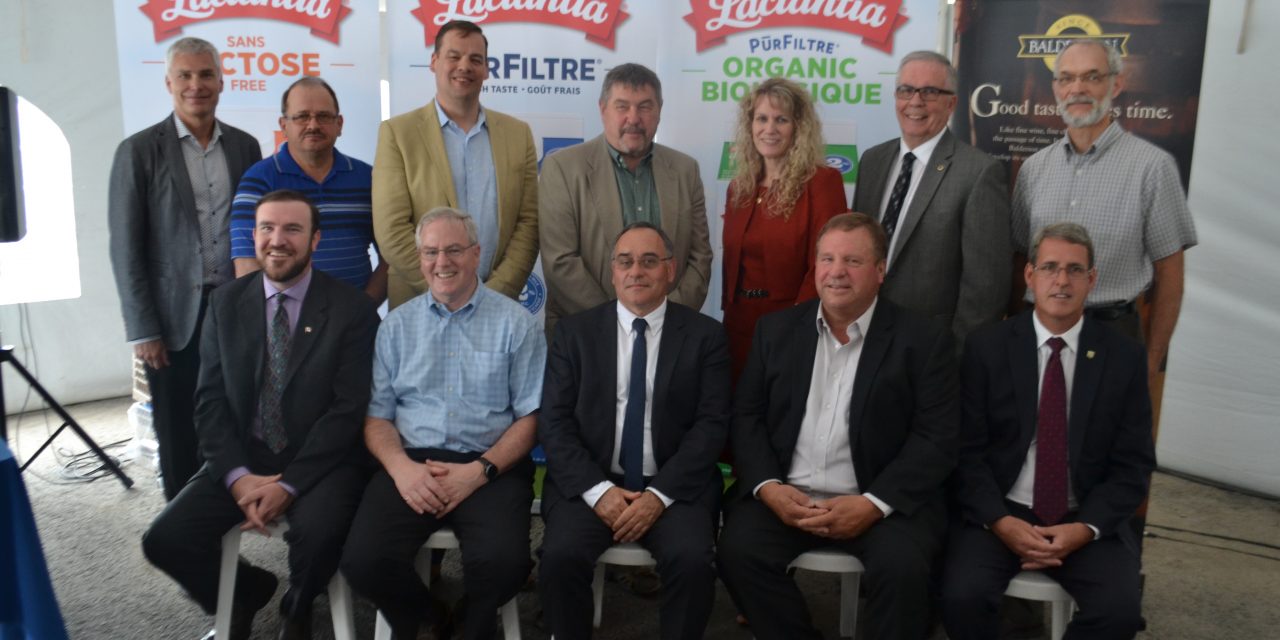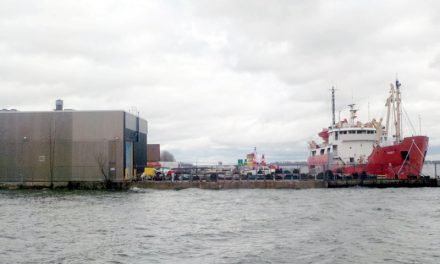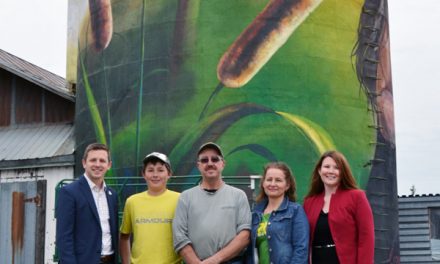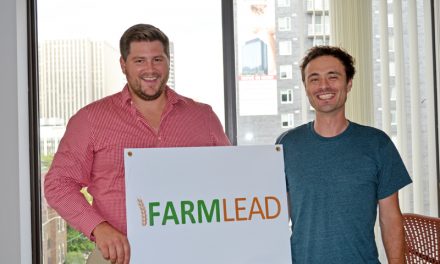Guests of honour gather at the Winchester Parmalat for the inauguration of the new ultrafiltration system. Back left, Bruce Shurtleff, Jaques Laforge, Graham Lloyd, Peter Gould, Christina Louis, Jim Bancroft and Stephen Wilson. Front left, Eric Duncan, Jim McDonell, Jean Paul Quiblier, Ralph Ditric and Grant Crack. Sawyer Helmer photo
by Kalynn Sawyer Helmer
AgriNews Staff Writer
WINCHESTER – On Tues., June 13, Parmalat Canada unveiled a new ultrafiltration system at the Winchester plant. The press release explains, “The installation of a new milk ultrafiltration system will be instrumental in increasing production capacity, among other benefits.
Noted for its energy efficiency and frugal use of municipal water resources, the equipment boasts an energy recovery rate of 98 per cent. Furthermore, this investment marks the creation of five new jobs, bring the plant’s total to 260 employees, and makes the facility the region’s largest private employer.”
Five speakers marked the occasion and all showed their enthusiasm for the new venture. For Senior Vice-president, Operations for Parmalat Canada, Jean-Paul Quiblier, the investment was a direct result of the recent agreement between producers and processors for the Class 7 milk through the National Ingredient Strategy. The new class allows Canadian producers to compete at a higher level with imported milk products.
The addition of the ultrafiltration system will, “increase the plant’s milk-processing capacity and to produce more cheese, of uniform quality, per production vat. The new milk ultrafiltration system gives dairy producers vast potential for growth and value for their milk, notably by allowing them to sell more milk,” wrote Parmalat. The system will allow for milk to be processed as soon as it is delivered meaning an improved quality to Parmalat’s products. “Quality cheese is made with quality milk, and quality milk is fresh milk,” said Quiblier.
Quiblier added that it is through the “support from the Dairy Farmers of Ontario (DFO) that the industry can look ahead with optimism.” This sentiment was shared by DFO representatives at the inauguration of the system on June 13. DFO General Manager, Peter Gould explained that the recent innovations have made a significant change to the nature of the relationships between processors and producers. “There has been a transition from a traditional producer/processor relationship to a strategic partnership.”
DFO Chair Ralph Ditric commended Parmalat for their willingness to put their “skin on the line,” through their commitment to invest money into the industry as a whole. Ditric went on to explain his belief that the dairy industry as a whole is every part working together. “Everybody wants growth. [This partnership] positions ourselves to produce better and higher quality products. We can use Canadian products from a responsible and financial manner to the benefit of all.”
MPP Grant Crack congratulated Parmalat and the DFO for their partnership and ensured that the government is committed to that partnership which is, “helping to get more local milk and cheese into Ontario glasses and plates.” MPP Jim McDonell followed up Crack saying, “when we have quality milk products from locals, produced into quality products, that looks to a bright future.”
On June 14, Parmalat Winchester processed a record 1.6-million litres of milk. In the newly built system, raw milk starts in the centrifuge which can handle 47,000 litres per hour and is raised from 4 or 5 celsius to 55 celsius. This separates the skim from the cream at a 42,000 skim to 5,000 cream, ratio. The heavier particles of the skim milk move to the side as the cream stays centred in the centrifuge and is then sucked out. It then travels to the Bactofuge. A similar system to the former which removes 75 per cent of the bacteria from skim milk.
The third step is the pasteurizer in which the product is raised to 74 celsius for 17 seconds and then travels directly to the ultrafiltration tank. The alpha plate pasteurizer handles 60,000 litres per hour and is the largest in Canada with 365 metal plates inside each section.
The pasteurized milk goes through eight stages of filtration to create the skim milk concentration. The milk permeate is brought to the reverse osmosis room where two outputs are possible. The first is the high concentrate lactose solids and powder blends. The second is water. This water is used to wash out the entire system which requires 30,000 litres of water per wash. With the self generated water, Parmalat Winchester will not require to use the township water, adding a green aspect to the production. The system gets used approximately four to five times a week for around 20 hours per process. Winchester Plant Director of Operations Bruce Shurtleff explained that as the system needs to be cleaned with each use so they try to be as efficient as possible.
The new system brings innovation and opportunity together and projects a bright future for the dairy industry.













